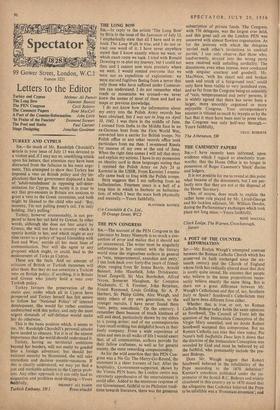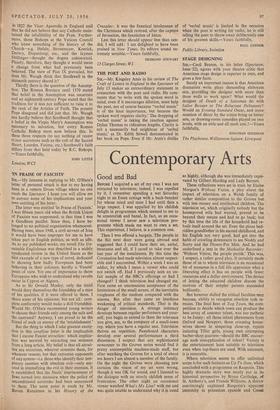A POET OF THE COUNTER- REFORMATION
Sir—Mr. Evelyn Waugh's attempted contrast between the Roman Catholic Church which has preserved its faith unchanged since the six- teenth century and the Church of England whose faith has radically altered since that date is surely quite unreal. He assumes that people who believe in the same propositions neces- sarily believe exactly the same thing. But is there not a great difference between Mr. Waugh's Catholicism and that of, say, Southern Italy or Spain? Southwell's Catholicism may well have been different from either.
Whether that is true or not, no Roman Catholic Bishop today bolds the same opinions as Southwell. The Council of Trent left the question of the Immaculate Conception of the Virgin Mary unsettled, and no doubt Robert Southwell accepted this coinpromise. But no Roman Catholic can take that view today. Pio Nono's bull Mefiabilis Deus lays it down that the doctrine of the Immaculate Conception was revealed by God and must be believed by all the faithful, who presumably include the pre- sent Bishops. in 1822 the Vicar Apostolic in England said that he did not believe that any Catholic main- tained the infallibility of the Pope. Further- more, those Bishops at the Vatican Council who knew something of the history of the ' Church--e.g. Hefele, Strossmayer, Kenrick, Darbry, Dupanloup, etc., and the layman DdllI nger—thought the dogma unhistorical Plainly, therefore, they thought it would mean a change from what had previously been believed. The view of Pius IX prevailed, but does Mr. Waugh think that Southwell in the sixteenth century shared it?
Thirdly there is the question of the Assump- tion. The Roman Breviary until 1570 stated that belief in the Assumption was uncertain and an eighteenth-century Pope stated that the tradition for it was not sufficient to raise it to the rank of the Articles of Faith. The present Pope disagreed and did just that. Mr. Waugh can hardly believe that Southwell thought that a belief in the Virgin Mary's Assumption was necessary to salvation, but every Roman Catholic Bishop must now believe this. In these three respects (to say nothing of recent minor accretions such as the cult of the Sacred Heart, Lourdes, Fatima, etc.) Southwell's faith differs from that held today by R.C. Bishops. —Yours faithfully, London, WCI JOHN LITTLE



















































 Previous page
Previous page